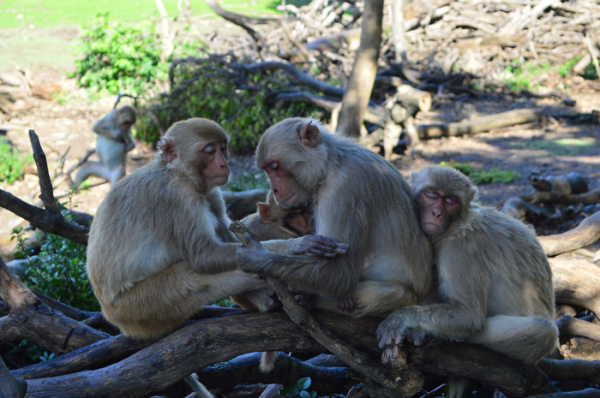Female monkeys prioritise friends and ‘actively reduce’ social circle as they age, study finds
It may be safer to stick with existing friends to minimise conflict and reduce disease transmission

Female rhesus monkeys prioritise friends and family as they get older and “actively reduce” their social networks, according to a new study.
The findings, published in the journal PNAS, also suggest that the older females aren’t shunned in their later lives, but that their social circle changes are driven by themselves.
Having fewer friends in old age is seen as harmful, including among humans, due to concerns about social isolation and loneliness in the elderly.
But recent studies have suggested that this narrowing of social networks in humans might be proactive and provide benefits in some ways.
Researchers from the University of Exeter in the UK have found that macaques also become increasingly selective, and focus on relatives and long-standing friendships in later life.
“This pattern of narrowing social networks with age is common in humans. Our study offers the most conclusive evidence to date that social selectivity is not unique to humans, and therefore might have deeper evolutionary underpinnings,” study co-author Lauren Brent said in a statement.
In the research, scientists studied eight years of data on more than 200 macaques, assessing how the social lives of each individual changed.
They found clear evidence of social selectivity by females while ruling out other explanations such as the death of partners.
“There are many possible reasons why macaques become more socially selective with age,” Erin Siracusa, another author of the study said.
“For example, the benefits of social interactions might change with time. Young macaques might benefit from a wide social group that can help them explore and find potential mates,” Dr Siracusa explained.
While the females in the study narrowed their network as they aged, scientists also found that they remained actively engaged in their social world.
“Aging females remained actively engaged in their social world and spent similar amounts of time grooming, being grooming and sitting near other females.spent similar amounts of time grooming, being grooming and sitting near other females,” Dr Siracusa explained.
“So, social declines were not caused by lack of interest or ability to engage,” she added.
For older macaques, researchers suspect it may be easier and safer to stick with family and existing friends for a number of reasons, including to minimise conflict and to reduce disease transmission as their immune systems decline with age.
“New relationships also require more mental effort, so while we see no decline in time spent socialising, older macaques might save mental energy by shrinking their network,” Dr Siracusa said.
“Taken together, our results provide rare empirical evidence for social selectivity in nonhumans, suggesting that patterns of increasing selectivity with age may be deeply rooted in primate evolution,” scientists wrote in the study.






Join our commenting forum
Join thought-provoking conversations, follow other Independent readers and see their replies
Comments